Seminar Series
Themes, dates and organizers
The consortium has been invited to several seminars to present and discuss its key project objectives and to create a forum for stakeholder interaction. The seminar series will be continued throughout the project and the recorded seminars provided to the public via the project website.
Seminar 1 | Seminar 2 | Seminar 3 | Seminar 4 | Seminar 5 | Seminar 6
Masterclass
environMENTAL Seminar 1
Identification of adverse environmental signatures and their effect on brain and behaviour
Friday, 8. April 2022; 9.00h to 12.00h CET, 16.00h to 21.00h Chinese time.
Organizer: Gunter Schumann, Fudan/Charite
Watch the complete environMENTAL Seminar 1
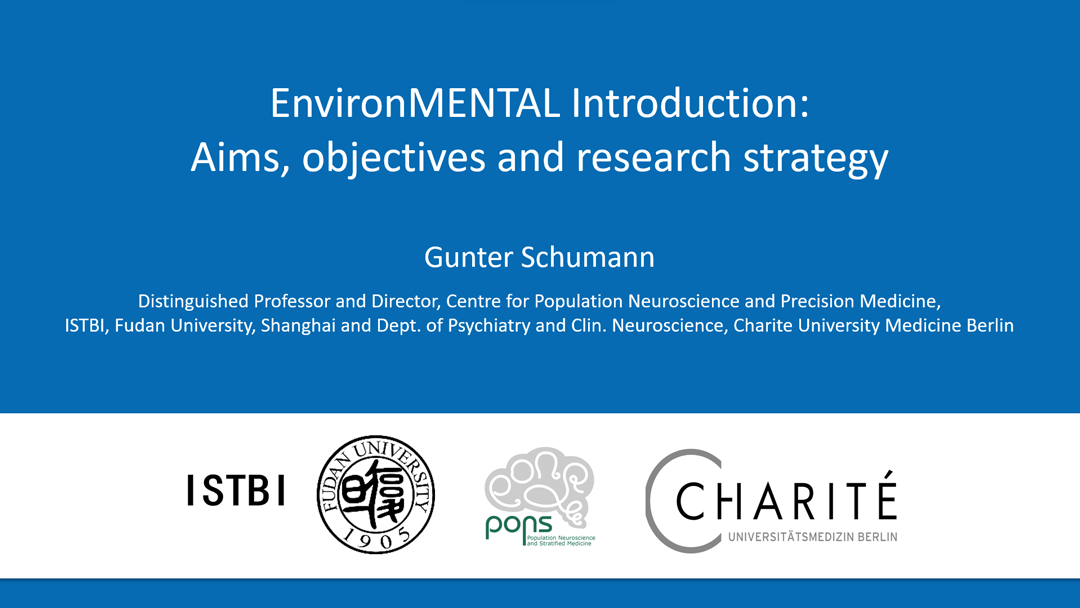
environMENTAL Introduction: aims, objectives and research strategy
Gunter Schumann,
Centre for Population Neuroscience and Stratified Medicine (PONS), ISTBI, Fudan University Shanghai and Dept. of Psychiatry and Neuroscience, Charité University Medicine, Berlin.
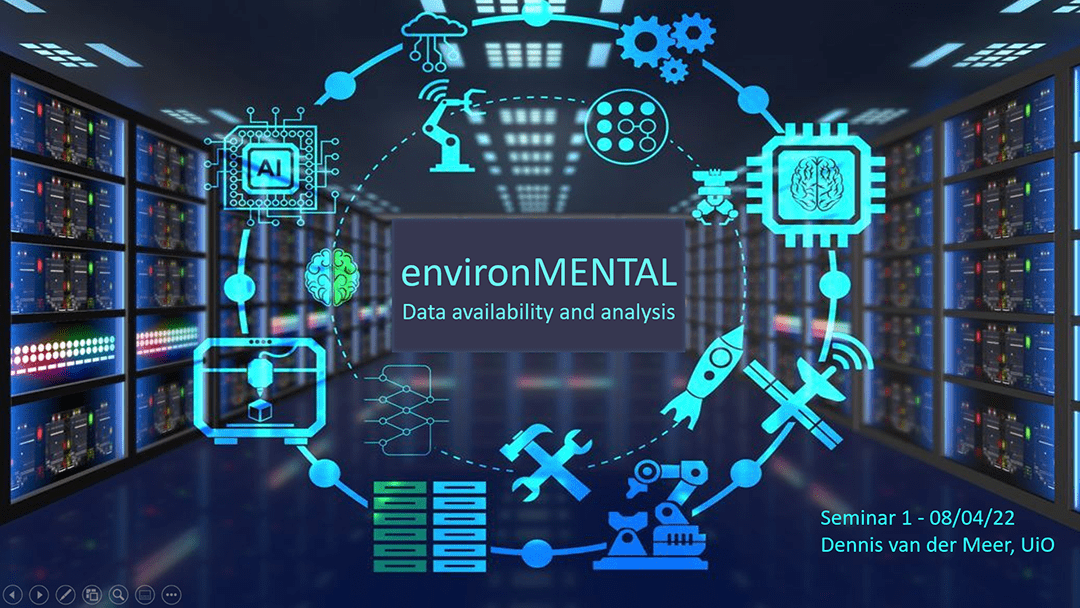
environMENTAL cohort description, harmonisation and data federation strategy
Dennis van der Meer, Lars T. Westlye & Ole A. Andreassen
Norwegian Centre for Mental Disorders Research (NORMENT), Division of Mental Health and Addiction, Oslo University Hospital & Institute of Clinical Medicine, University of Oslo, Norway. Department of Psychology, University of Oslo, Norway
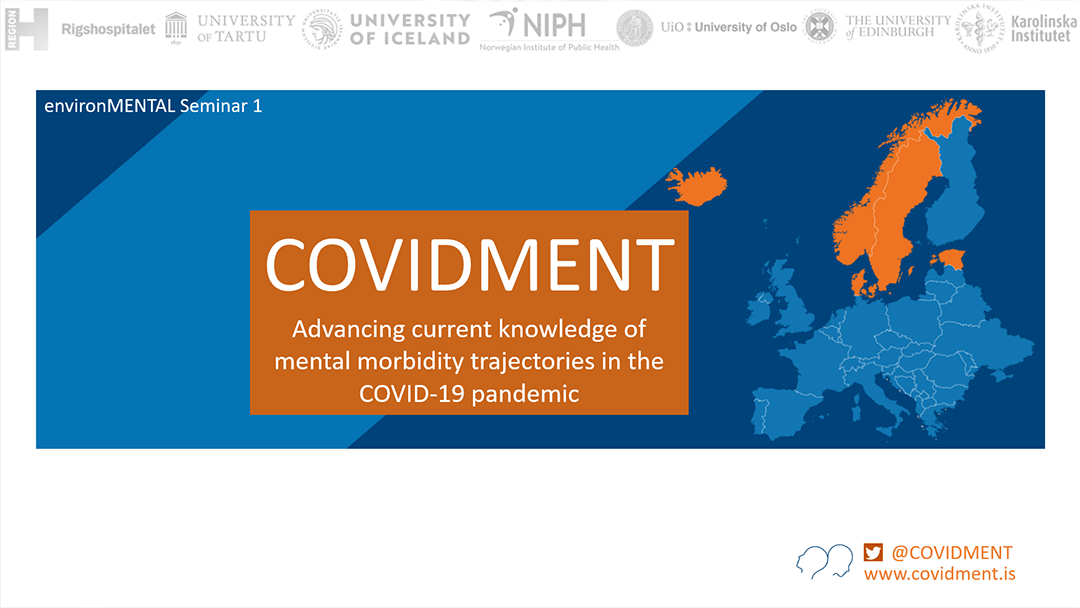
environMENTAL approach to advance knowledge on mental trajectories associated with the pandemic: the COVIDMENT collaboration
Helga Ask, Lars T. Westlye, Ole A. Andreassen & Unnur A. Valdimarsdotttir
Department of Mental Disorders, Norwegian Institute of Public Health, Oslo, Norway. Department of Psychology, University of Oslo, Norway
Norwegian Centre for Mental Disorders Research (NORMENT), Division of Mental Health and Addiction, Oslo University Hospital & Institute of Clinical Medicine, University of Oslo, Norway. Center of Public Health Sciences, Faculty of Medicine, University of Iceland, Reykjavik, Iceland.
Department of Medical Epidemiology and Biostatistics, Karolinska Institutet, Stockholm, Sweden. Department of Epidemiology, Harvard T.H. Chan School of Public Health, Boston, MA, USA.
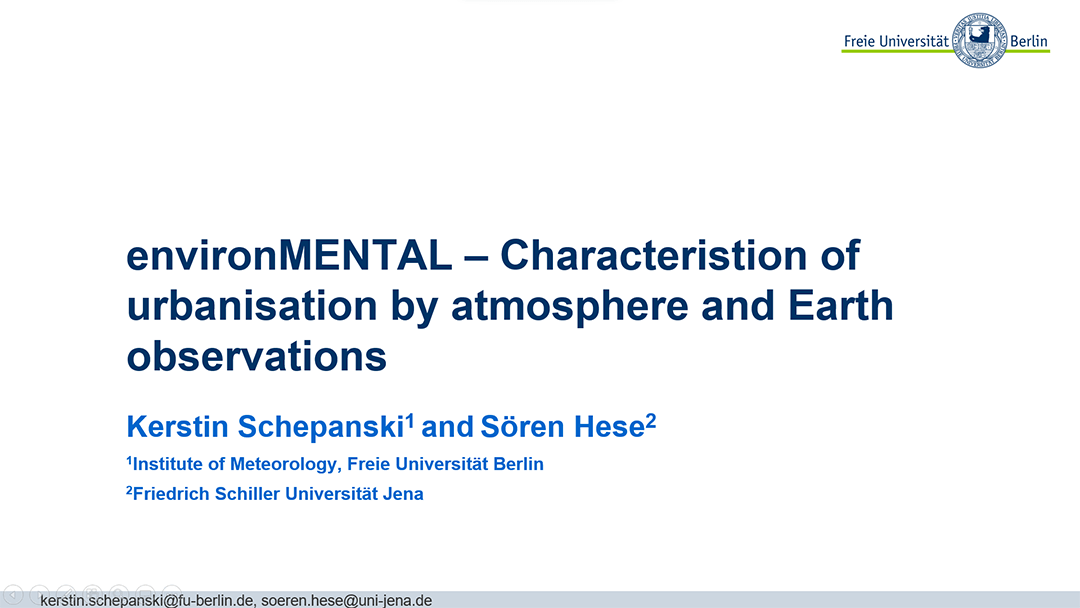
environMENTAL characterisation of urbanisation and climate by atmosphere and earth observation
Kerstin Schepanski, Sören Hese
Free University Berlin, Institute for Meteorology, Radiation and Remote Sensing. 2Friedrich Schiller University Jena, Institute for Geography, Remote Sensing
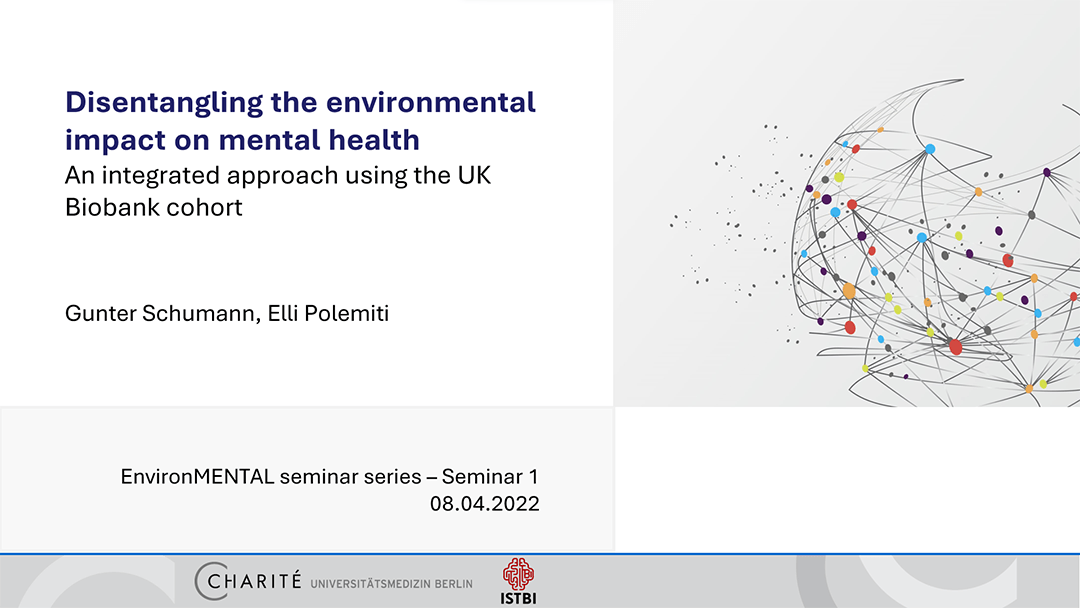
Disentangling the environmental impact on mental health – an integrated approach using the UK biobank cohort
Elli Polemiti, Gunter Schumann
Centre for Population Neuroscience and Stratified Medicine (PONS), ISTBI, Fudan University Shanghai and Dept. of Psychiatry and Neuroscience, Charité University Medicine, Berlin.
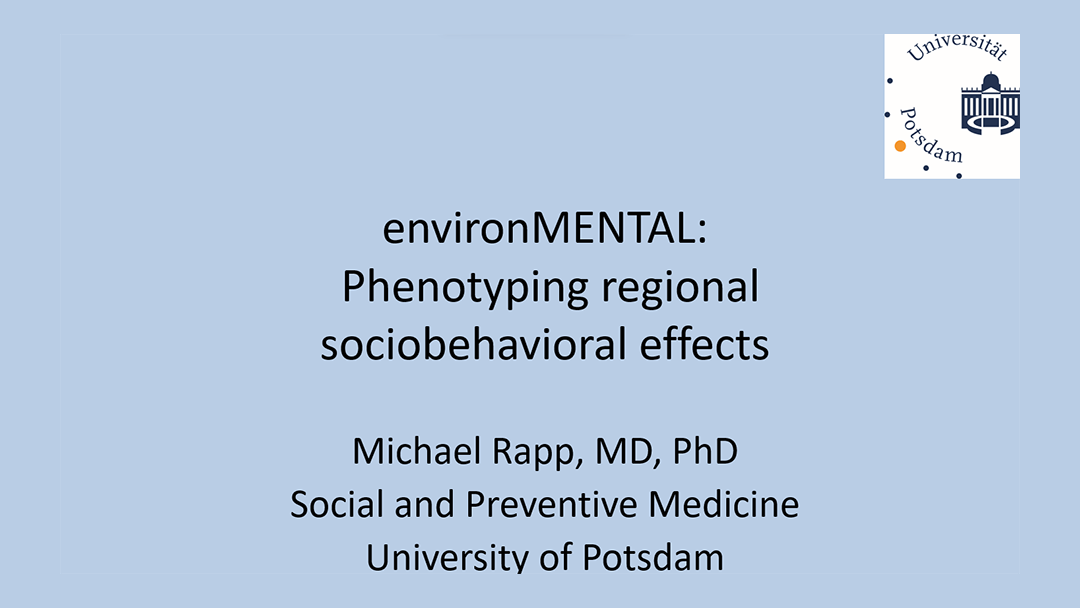
environMENTAL approach to app-based and ecological momentary assessment, and behavioural characterisation
Frauke Nees, Michael Rapp
Institute of Medical Psychology and Medical Sociology, University Medical Center Schleswig-Holstein, Kiel University, Kiel, Germany
Department for Social and Preventive Medicine, University of Potsdam, Potsdam, Germany
environMENTAL Seminar 2
Friday, 22. April 2022; 9:00 to 12:00 GMT/10:00 to 13.00 CET
Organizer: Sylvane Desrivières, King’s College London, United Kingdom
Watch the complete environMENTAL Seminar 2
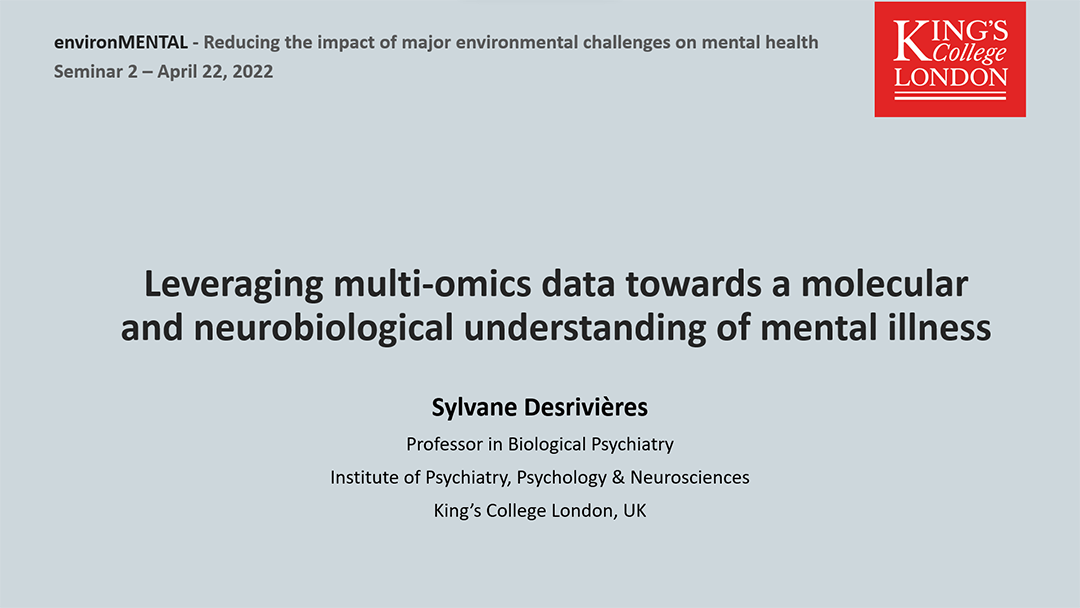
environMENTAL Leveraging multi-omics data towards a molecular and neurobiological understanding of mental illness
Sylvane Desrivières
Professor in Biological Psychiatry
Institute of Psychiatry
Psychology & Neurosciences
King’s College London, UK
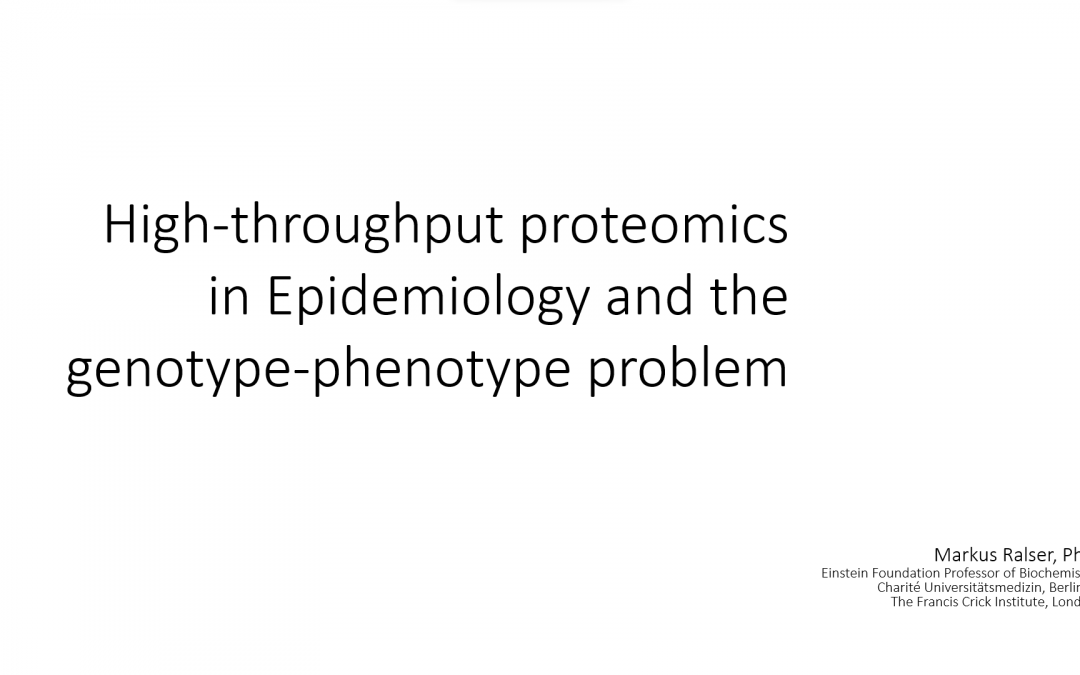
environMENTAL Applications of ultra-high-throughput proteomic analyses
Markus Ralser
PhD Einstein Foundation Professor of Biochemistry Charité Universitätsmedizin
Berlin & The Francis Crick Institute, London
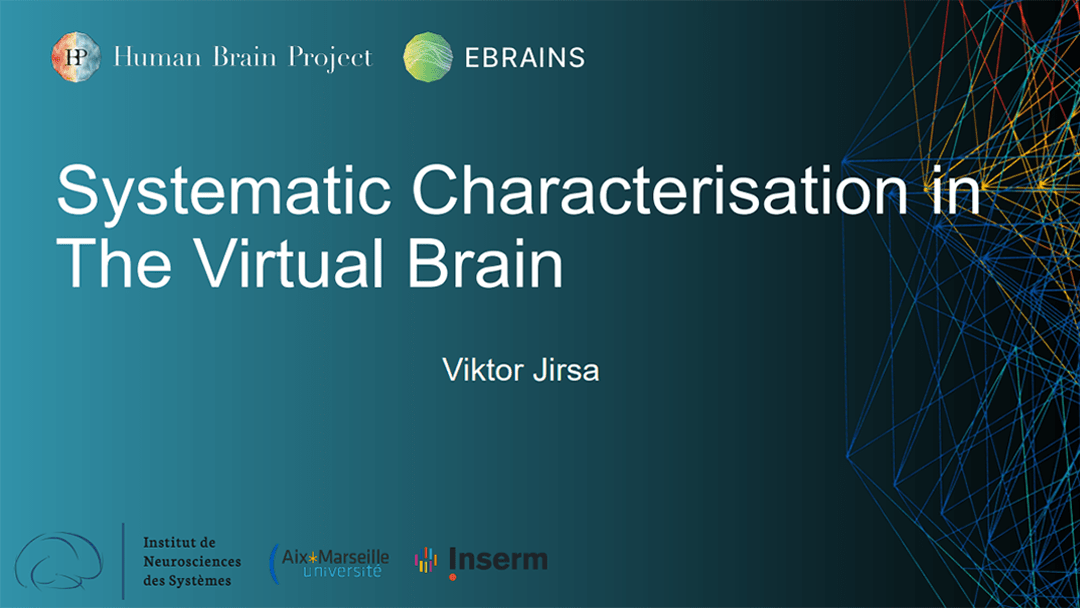
environMENTAL Systemic characterisation in virtual brain models
Viktor Jirsa
Director, Institute of System Neuroscience, Aix-Marseille University, France
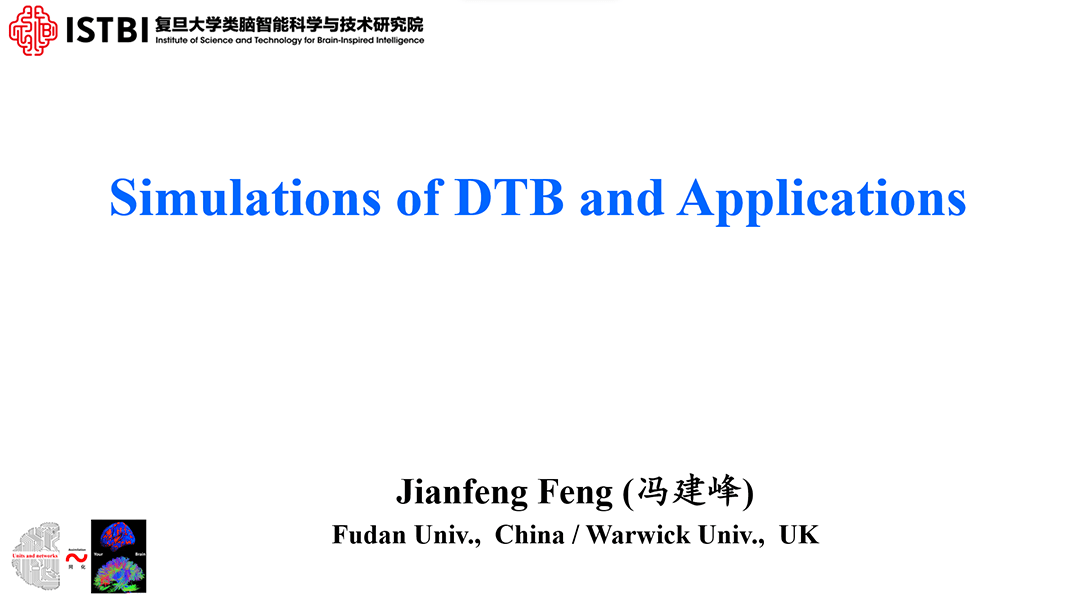
environMENTAL Simulation of Digital Twin Brains and Applications
JianfengFeng (冯建峰)
FudanUniv., China / WarwickUniv., UK
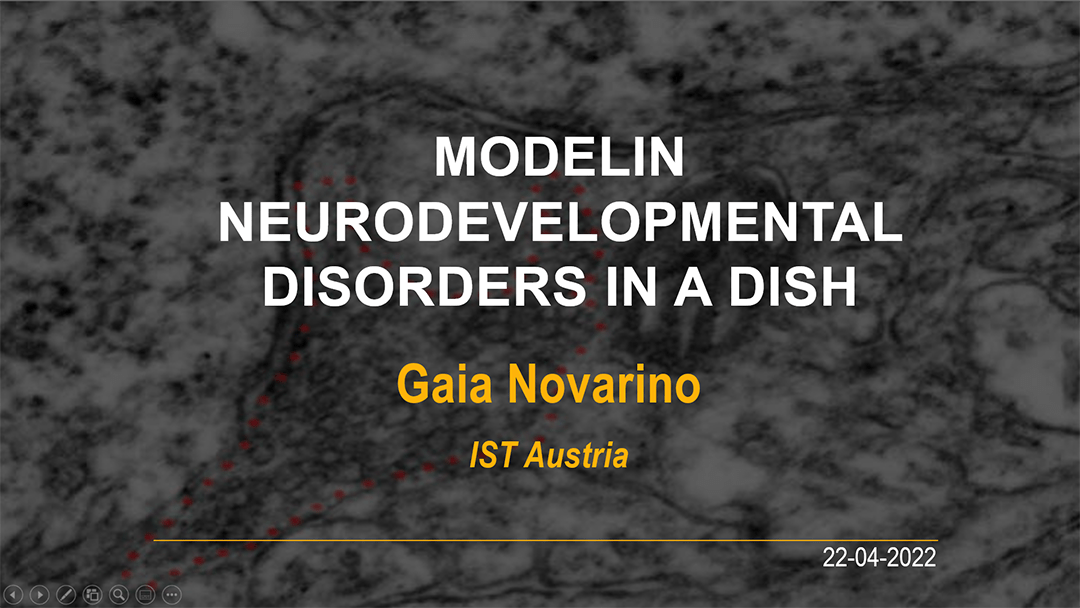
environMENTAL Pluripotent stem cell lines and 3D brain organoids
Gaia Novarino
Professor, Institute of Science and Technology Austria
environMENTAL Seminar 3
Monday, 23. May 2022; 9.00h to 12.00h CET, 16.00h to 21.00h Chinese time.
Organizer: Andre Marquand, Donders Institute
Watch the complete environMENTAL Seminar 3
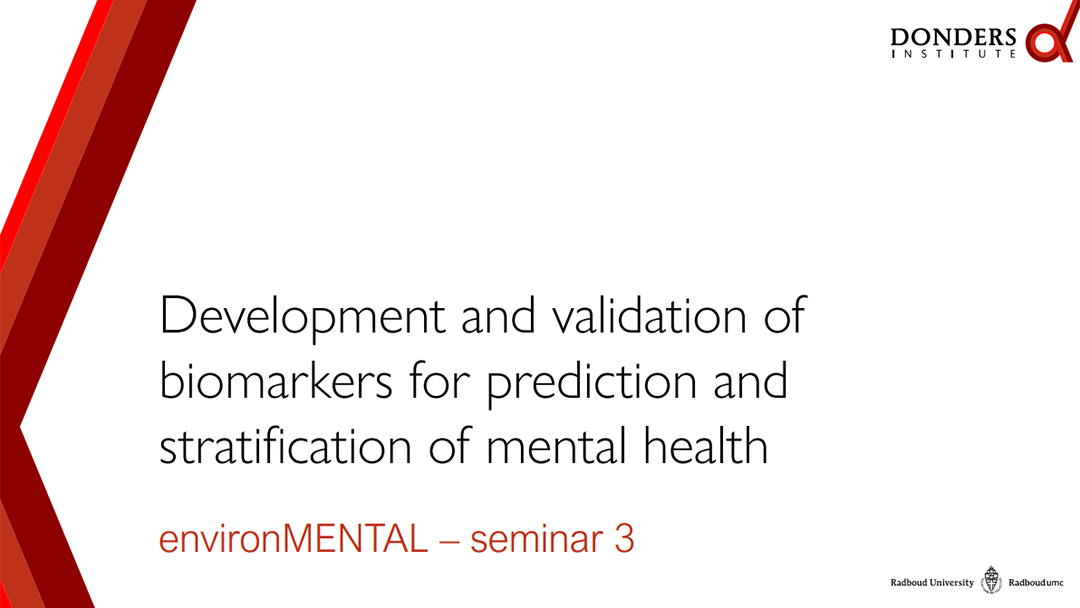
environMENTAL Methodological approaches for MRI data integration biomarker discovery and validation within the environmental project
Andre Marquand
Associate professor
Donders Institute/ Radboudumc
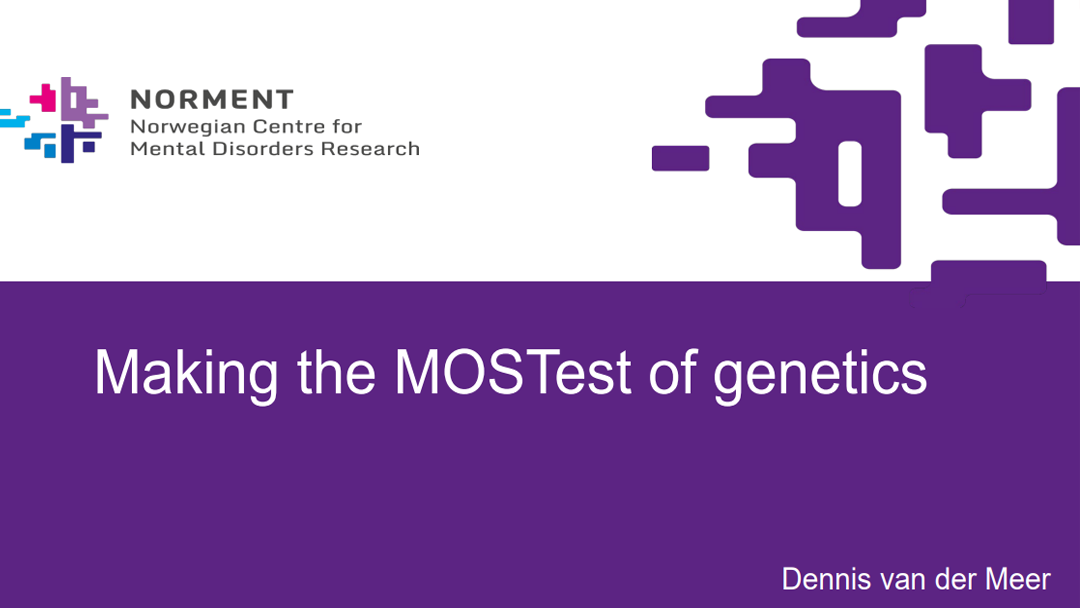
environMENTAL Making the MOSTest of genetics multivariate approaches to variant discovery and disorder prediction
Dennis van der Meer
Assistant professor at Maastricht University
and researcher at University of Oslo

environMENTAL Validation of putative biomarkers in clinical cohorts (1)
Henrik Walter
Director of the Research Division of Mind and Brain
Deputy Medical Director (Research) of the Department of Psychiatry and Clinical Neuroscience
Charite-Universitatsmedizin Berlin
Corporate member of Freie Universitat Berlin and Humboldt-Universitat zu Berlin, Berlin, Germany
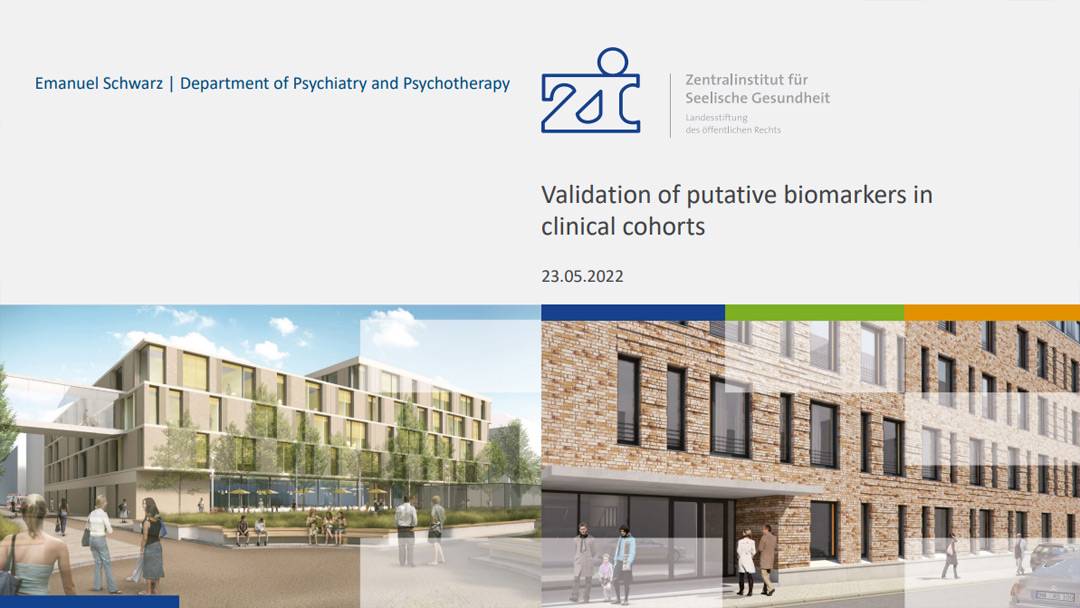
environMENTAL Validation of putative biomarkers in clinical cohorts (2)
Emanuel Schwarz
Group Leaper Translational Bioinformatics in Psychiatry
Central Institute of Mental Health in Mannheim, Germany
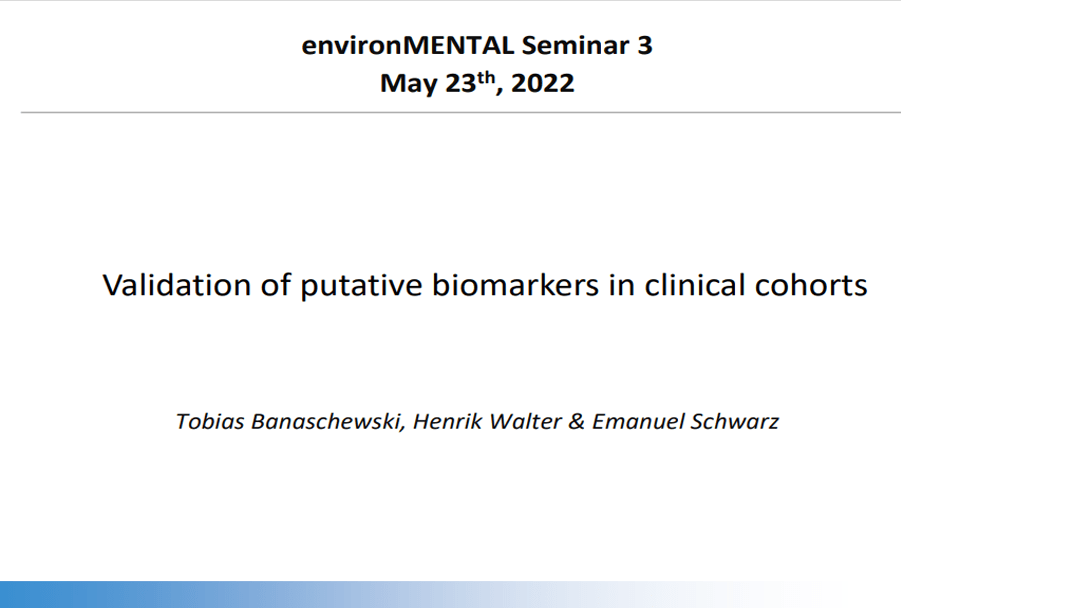
environMENTAL Validation of putative biomarkers in clinical cohorts (3)
Tobias Banaschewski
Director of the Department of Child and Adolescent Psychiatry of the Central Institute of Mental Health in Mannheim, Germany
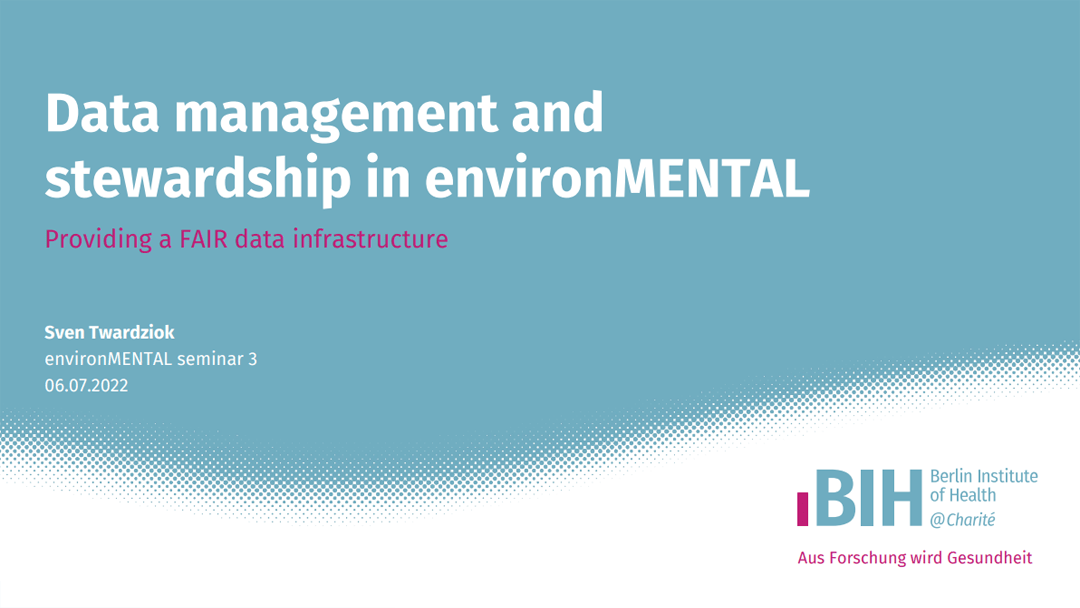
environMENTAL Data management and stewardship in environMENTAL
Sven Twardziok
Group leader at the
Berlin Institute of Health
environMENTAL Seminar 4
Friday, 24. June 2022; 9.00h to 12.00h CET, 16.00h to 21.00h Chinese time.
Organizer: Peter Sommer, KsiLink
Watch the complete environMENTAL Seminar 4
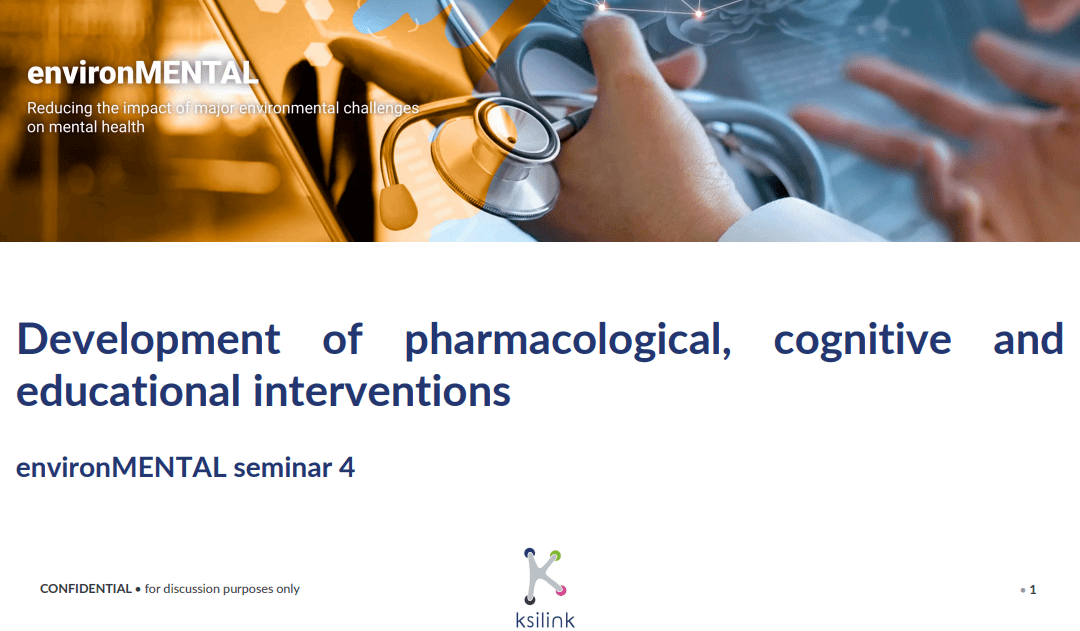
Challenges and opportunities for drug discovery in mental disorders
Peter Sommer
Scientific Director
Ksilink, France
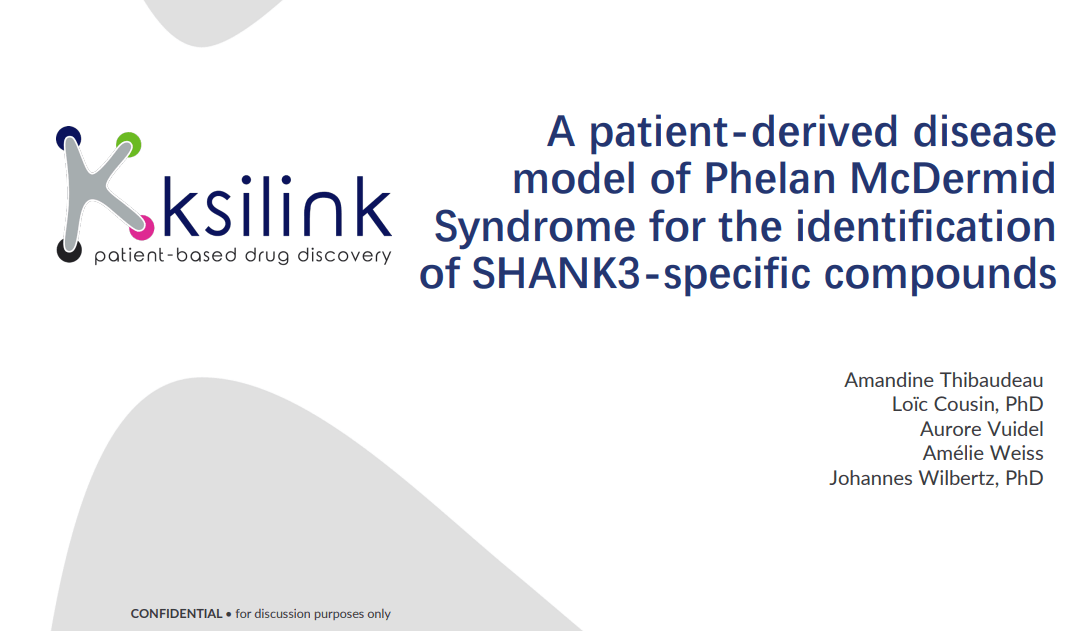
Implementation of a patient-derived disease model of Phelan McDermid Syndrome for the identification of SHANK3-specific chemical modifiers
Johannes Wilbertz
Project team leader
Ksilink, France
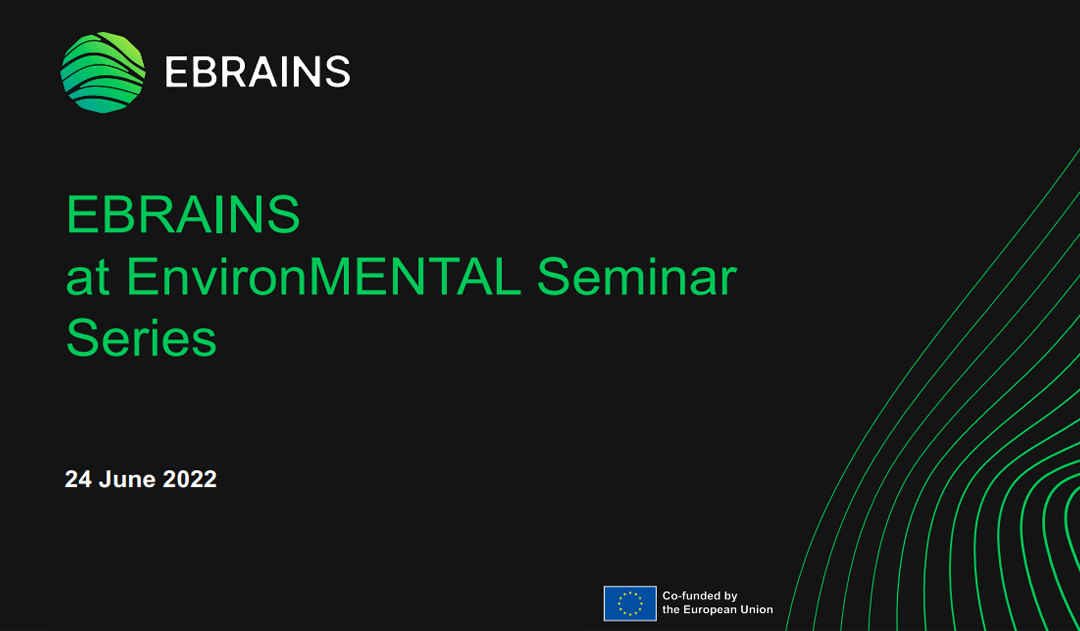
EBRAINS user engagement
France Nivelle
Chief Communications and Content Officer
EBRAINS
environMENTAL Seminar 5
Organizer: Bernd Carsten Stahl, DMU
Watch the complete environMENTAL Seminar 5
One of the five objectives of the EnvironMENTAL project is to establish a programme of Responsible Research and Innovation (RRI) that will:
- enable ongoing stakeholder engagement throughout the project;
- facilitate critical reflection and consultation on ethical and social consequences; and
- uphold the project’s societal “licence to operate” through two-way dialogue with patients, citizens and other key stakeholders.
This is important because the project’s processes and outcomes can raise ethical questions and social concerns as it aims to develop intervention for mental health caused by environmental challenges through the development of various technologies including virtual reality and mobile technology. Also, the project will bring together large-scale cohort-based neuroscience, engage in molecular investigation and engage with large numbers of patients. Taken together they may have additional positive as well as negative consequences that need to be considered from the outset.
This seminar will chart the course for activities that will contribute to this objective. It will focus on four main themes that will be relevant across the research and development activities in the project: data stewardship, responsible technology development, approaches to stakeholder engagement and the broader questions that affect the licence to operate. The seminar is structured as a series of panel and plenary discussions where the main topics will be discussed by researchers and stakeholders of the project. The aim is to identify commonalities but also differences that will allow the design of a detailed plan for the responsible research and innovation work plan in the project.
Agenda:
0900 Welcome
Prof. Bernd Stahl
0910 Data Stewardship
Chair: Prof Sven Twardziok
Dr Marcel Jentsch
Prof Sylvane Desrivieres
Prof Dennis van der Meer
Prof Tianye Jia
The project will collect and analyse large amounts of data of different levels of confidentiality. Data protection, data management and data governance will therefore be key concerns. This panel will discuss how environMENTAL can achieve its scientific objective while going beyond legal compliance and move in the direction of societally acceptable data stewardship.
0950 Responsible technology development / ethics by design
Chair: Dr Lise Bitsch
Prof Mel Slater
Dr Sebastian Siehl
Dr (Med) Jakob Kaminski
The project will undertake technology development mostly focused on virtual reality and the development of smartphone apps. Such technologies can raise various concerns about use and misuse of data, manipulation of users, consequences of use etc. There is a long-standing discussion of how ethical and social concerns can be integrated into technology development and design with a prominent approach being that of value-sensitive design.
1030 Engagement with patients, citizens and other stakeholders
Chair: Dr George Ogoh
Prof Dr Isabel Dziobek (DZP)
Cecilie Busch-Christensen
Ingebord Helle Vedde
Engagement with patients and citizens is a key part of environMENTAL and a cornerstone of the responsible innovation approach. Relevant themes include: patient centredness; Integration of patient views into study design; Methods of public engagement; Response of the project to citizen input.
1100 Licence to operate
Prof Bernd Stahl
Prof Tobias Banaschewski
Prof Gunter Schumann
Prof Henrik Walter
This term denotes the importance of publicly funded research projects to be deemed acceptable and desirable by the citizens and their representatives. This is influenced by the behaviour of scientists (e.g. research ethics and integrity) but also by broader question Epistemological foundations: what can we realistically promise; how self-critical can the project be? Anticipation: what predictable consequences would arise from a success of the project as well as from failure to achieve its aims? Ethics compliance; research ethics: how are research ethics issues addressed in the project? AI ethics: how does the project engage with the broader concerns about AI, in particular AI in medicine?
1150 Closing remarks
Prof Bernd Stahl
1200 End
environMENTAL Seminar 6
Enrichment
Friday, 16 December 2022;
Organizer: Frauke Nees, UKSH
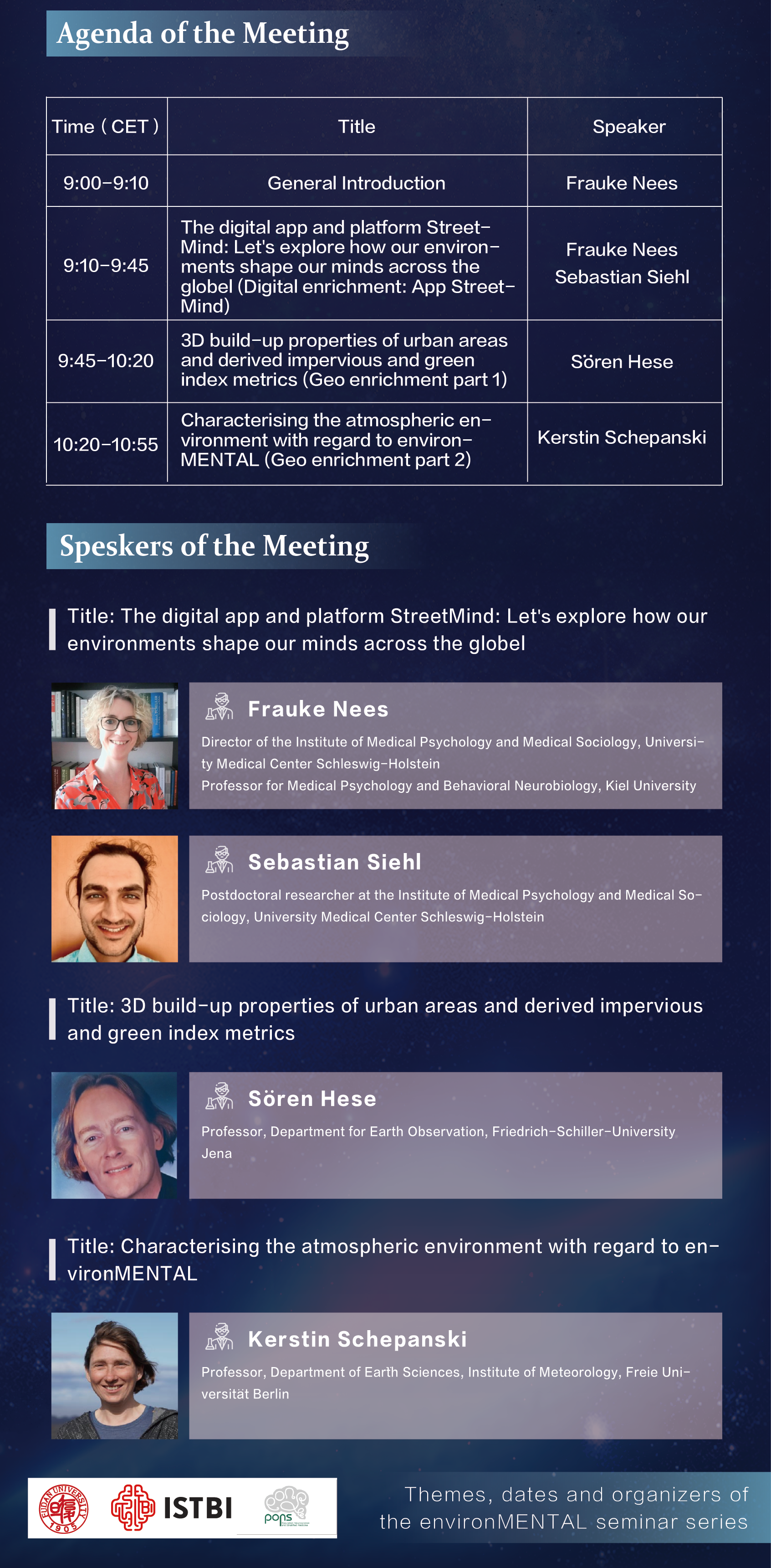
Agenda
- General Introduction Frauke Nees, UKSH
- The digital app and platform StreetMind: Let’s explore how our environments shape our minds across the globe
Frauke Nees and Sebastian Siehl, UKSH - 3D build-up properties of urban areas and derived impervious and green index metrics
Sören Hese, Friedrich-Schiller University of Jena - Characterising the atmospheric environment with regard to environMENTAL
Kerstin Schepanski, Free University of Berlin
environMENTAL Masterclass
Wednesday 18 March 2025
Organizer: Mel Slater, UB
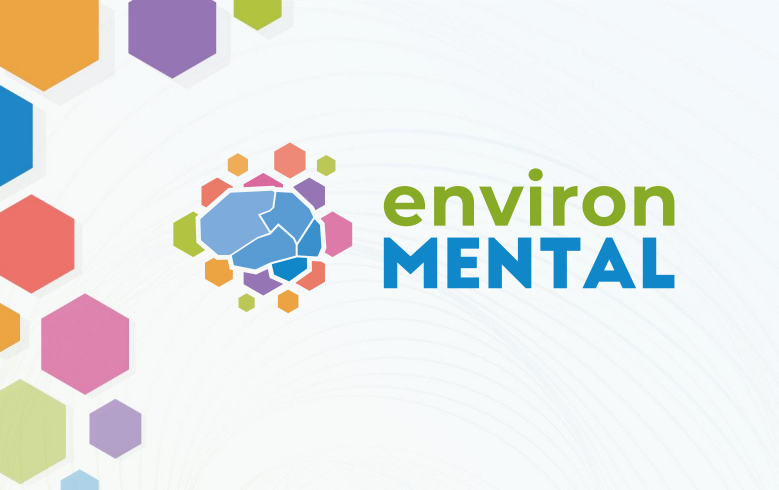
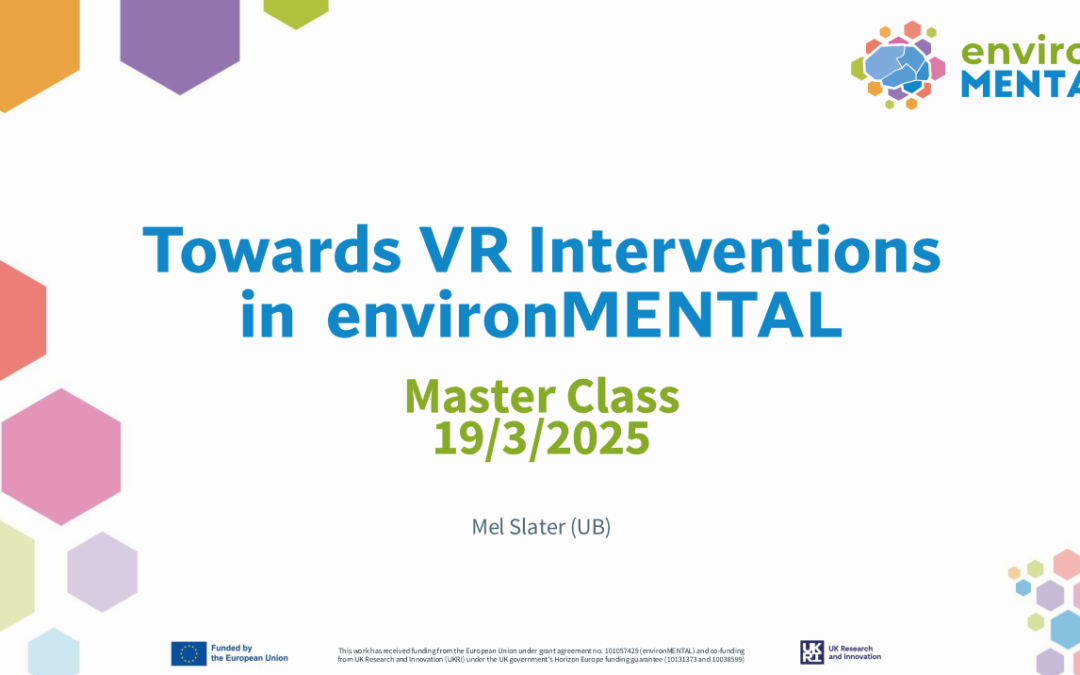
Towards VR Interventions in environMENTAL
Mel Slater,
University of Barcelona

